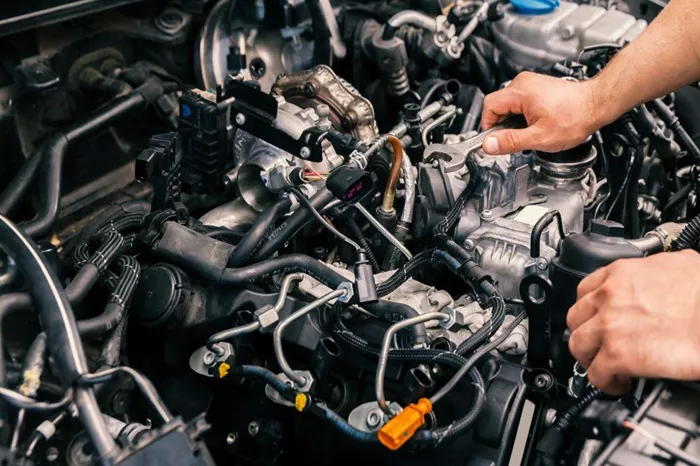Understanding the potential damage caused by using diesel fuel in a gasoline engine is crucial for anyone who operates or maintains vehicles. This article explores the consequences of this mistake, delves into the differences between diesel and gasoline engines, and provides guidance on what to do if you accidentally fill your gas tank with diesel fuel.
The Fundamental Differences Between Diesel and Gasoline Engines
Combustion Process
Gasoline engines and diesel engines operate on fundamentally different principles. Gasoline engines use spark plugs to ignite a mixture of fuel and air. In contrast, diesel engines rely on the heat of compressed air to ignite the fuel.
Fuel Properties
Diesel fuel and gasoline have distinct chemical compositions. Diesel is heavier and oilier than gasoline. It contains more energy per gallon but burns more slowly.
Engine Design
Diesel engines are built to withstand higher compression ratios, which are necessary for the combustion process. Gasoline engines, on the other hand, are designed for lower compression ratios.
Immediate Effects of Diesel Fuel in a Gas Engine
Starting Problems
One of the first signs of diesel in a gas engine is difficulty starting the vehicle. Gasoline engines rely on the volatility of gasoline for easy ignition, and diesel does not provide this.
Misfiring and Stalling
If the engine does start, it will likely run poorly. You may experience misfiring, knocking, and stalling. This is because diesel fuel does not combust properly in a gasoline engine.
Excessive Smoke
Burning diesel in a gasoline engine produces excessive smoke. This smoke is a result of incomplete combustion of diesel fuel.
Long-Term Damage
Fuel System Contamination
Diesel can contaminate the entire fuel system of a gasoline engine. Fuel lines, injectors, and the fuel pump can become clogged with diesel residue.
Damage to Spark Plugs
Spark plugs can be fouled by diesel fuel. Since diesel is not as volatile as gasoline, it can leave deposits on the spark plugs, reducing their effectiveness.
Catalytic Converter Issues
Diesel fuel can damage the catalytic converter, an essential component of the exhaust system. The catalytic converter is designed to work with gasoline emissions, and diesel can clog or damage it.
Engine Knock
Engine knock is a serious issue that can result from using diesel in a gasoline engine. It occurs when fuel burns unevenly in the engine’s cylinders, causing knocking sounds. This can lead to severe engine damage over time.
What to Do If You Put Diesel in a Gas Engine
Do Not Start the Engine
If you realize you’ve put diesel in your gas tank, do not start the engine. Starting the engine will circulate diesel fuel through the fuel system, causing more damage.
Drain the Fuel Tank
The first step is to drain the fuel tank. This can be done by a professional mechanic or, in some cases, by using a fuel siphon.
Flush the Fuel System
After draining the tank, the entire fuel system should be flushed. This includes the fuel lines, fuel pump, and injectors.
Replace Fuel Filters
Fuel filters should be replaced after flushing the system to ensure no diesel residue remains.
Check for Damage
Have a mechanic check for any potential damage to spark plugs, the catalytic converter, and other engine components.
See also: Is Diesel Fuel Made From Crude Oil?
Preventative Measures
Be Cautious at the Pump
Always double-check the fuel pump before filling up. Pay attention to the labels on the pump to avoid using the wrong fuel.
Fuel Cap Labels
Consider adding a label to your fuel cap to remind yourself or anyone else who might refuel your vehicle about the correct type of fuel.
Education
Educate anyone who drives your vehicle about the importance of using the correct fuel.
Understanding the Impact on Performance
Reduced Efficiency
Using diesel fuel in a gasoline engine can significantly reduce engine efficiency. The engine may not run at its optimal performance, leading to increased fuel consumption.
Power Loss
The engine may experience a loss of power. This is because diesel does not combust as efficiently in a gasoline engine, leading to less power output.
Increased Emissions
Diesel in a gasoline engine can lead to increased emissions. This can cause the vehicle to fail emissions tests and contribute to environmental pollution.
The Cost of Repairs
Immediate Costs
The immediate costs of draining and flushing the fuel system can be significant. This includes labor costs for the mechanic and the cost of replacing fuel filters.
Potential Long-Term Costs
Long-term costs can include replacing damaged engine components, such as the catalytic converter, spark plugs, and fuel injectors. Severe engine damage may require more extensive repairs or even engine replacement.
Comparing Diesel in Gasoline Engines vs. Gasoline in Diesel Engines
Diesel in Gasoline Engines
1.Difficult to start
2.Poor engine performance
3.Potential long-term damage
Gasoline in Diesel Engines
1.Severe engine damage
2.Potential for engine failure
3.High repair costs
Conclusion
Using diesel fuel in a gasoline engine can cause immediate and long-term damage. From difficulty starting the engine to potential engine knock and catalytic converter damage, the consequences can be severe and costly. It is crucial to avoid this mistake by being cautious at the fuel pump and educating yourself and others about the importance of using the correct fuel. If the mistake does happen, taking immediate action by not starting the engine and having the fuel system drained and flushed can save you from extensive repairs and high costs.
Related topics:

